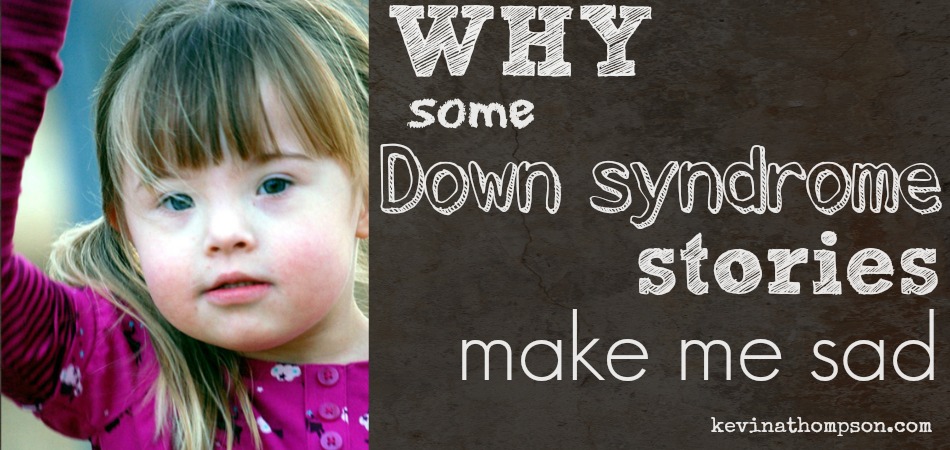It happened again over the weekend. An inspiring story of a child with special needs went viral. The story contained every necessary element to be inspiring–a courageous person with special needs, caring and compassionate friends, and a special opportunity to have dreams come true.
On a nearly monthly basis one of these stories makes national news–a football player scores a touchdown, a basketball player makes a shot, or a princess goes to the prom. (See: Down Syndrome Is Not My Problem)
As a parent of a child with special needs, these stories encourage me of what the future could hold for my daughter. They remind me of the possibilities which lay before her if she is empowered to face life and the love which awaits her as the true compassion of humanity is exposed.
Yet there is a secret about these stories which few parents admit: these inspiring stories also sadden me.
It’s not the primary reaction. It’s not the overarching feeling. But it is an aspect of every story about a child with special needs.
In the midst of the inspiration, every story is also a reminder of the sorrows and limitations which come with a physical, developmental, or cognitive delay.
They are full of encouragement, but they are also full of sorrow. (See: It’s Okay to Laugh and Cry)
A few months after our daughter was born with Down syndrome, a group of women from our church attended a women’s conference. On the Saturday of the conference, I began to receive text messages, then email, and when they returned for Sunday worship many of them told me, “You have to see it.”
At the conference, a young woman with Down Syndrome was called on stage by one of the worship leaders. As the singer sang, the young woman signed to the song. It was a touching worship experience for everyone, but especially for those women from our church.
For a few months, they had heard about Down syndrome, but at the conference they saw it. They experienced the hope, potential, and love which so many people with Down syndrome possess. They knew I needed to see the same.
They encouraged me to watch the video.
I did. And I wept. (See: How I Told My Son His Sister Has Down Syndrome)
Still in the phase of shock from life going an unexpected direction, the video was more than I wanted to see. I was trying to come to grips with my infant with Down syndrome; I did not need to think about the realities of having a young adult child with Down syndrome.
What was helpful for my friends, was not helpful for me. What they were certain I needed to see, I didn’t want to see.
If I saw the video today I would probably have a different response. I’m in a different place now than I was then.
It’s an often forgotten truth—the emotion something creates within me is not necessarily the emotion it will create within others. What touches my heart may not touch yours.
We assume others will, or at least should, see the world the way we do. Ideas which persuade us should persuade others. Movies which move us should move others. Songs which touch us should touch others.
But they don’t. (See: How Many Chromosomes Will We Have in Heaven)
Your best friend can hate your favorite movie. Your spouse can love a song you despise. Your political opponent can watch a debate and think your candidate lost.
Two people can look at the same information and come to different conclusions. We can share the same experience but have drastically different emotions regarding it.
So when I see a story about someone with Down syndrome, I might be encouraged, hopeful, and touched or I might be heartbroken, grief-stricken, and sad. Because whenever I watch a video or read a story, I’m also thinking about my daughter. While the story might remind me of the hope which is before her, it also reminds me of the challenges which she faces and will face.
Since my daughter’s birth eight years ago, I’ve noticed a subtle difference in what people say when they share stories which can make a big difference. When they say “You need to watch this” my reaction can be all over the board. It all depends on what I’m feeling in the moment. However, if they say, “This was meaningful to me” or “This helped me better understand your situation” or “This taught me _____ about Ella,” I watch the video or read the story with a completely different mindset.
Instead of looking at it through my lens, I try to see it through theirs. Knowing it helped them, I listen and learn to see what helped.
The Sunday after my daughter was born, I preached a sermon at our church. In the sermon, I spoke at length about the birth of our daughter. In the past eight years, it has been one of the most requested sermons I’ve preached.
Nearly every quarter, someone calls me and asks for a copy of that sermon because someone they know has given birth to a child with Down syndrome or received a prenatal test indicating Down syndrome.
I’m always honored when people ask for the recording, but I also give a suggestion. “Don’t tell them they need to listen to this. Instead, tell them what you felt when you heard the sermon and why it was meaningful to you.”
Never hesitate to share a story, but always realize others may not respond to it the way you do.




4 Responses to Why Some Down Syndrome Stories Make Me Sad